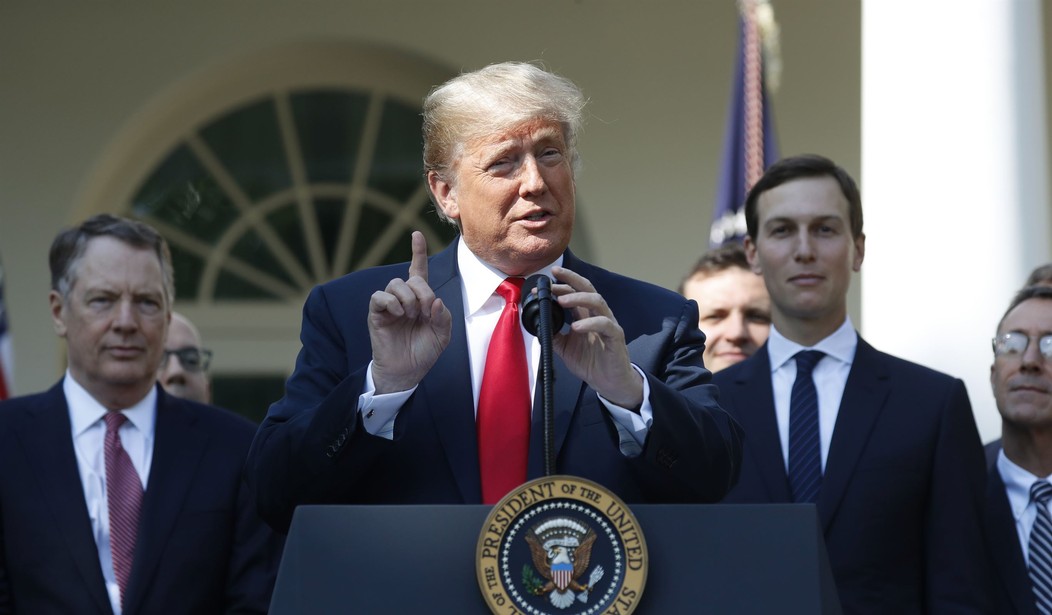The narrative surrounding the impending trade deal with Mexico — and the inability thus far to adequately address the migrant crisis at the southern border— has thus far been focused mainly on Trump’s threat of levying a 5% tariff on Mexican goods if gains aren’t made on the Mexican side to address illegal immigration.
But the debate could ultimately help get the new trade deal — called the United States-Mexico-Canada Agreement (USMCA) — passed by Congress when the time comes because tariffs and passage of the USMCA are being framed in opposition to one another and Democrats are being forced to make a choice.
It may also — and this is a longer shot — open up discussions on The Hill about finally drafting comprehensive immigration legislation.
Trump's promise to impose incrementally-increasing tariffs on incoming Mexican goods, to begin on June 10th and go all the way into the fall, has led a delegation of Mexican officials to make the trip to Washington, D.C. this week to discuss ways to meet the desires of the Trump administration. Specifically, Trump is asking Mexico to help cut the flow of migrants and illicit drugs across the southern border.
Many press accounts have the delegation — led by Mexican Foreign Minister Marcelo Ebrard, who is scheduled to meet with U.S. Secretary of State Mike Pompeo Wednesday — expressing optimism that the Washington meetings will be fruitful.
THIS JUST IN: Mexican Foreign Minister Marcelo Ebrard sees 80% odds of negotiating a deal with @realDonaldTrump on migration to avoid the imposition of tariffs on the nation's exports.
— Eric Martin (@EMPosts) June 4, 2019
"We are going to find a common ground I think" he tells reporters including @benbain in DC pic.twitter.com/3JuOg3hv4W
Mexico’s President Andres Manuel Lopez Obrador said Saturday he expected “good results” from the delegation trip and hinted he was prepared to tighten immigration controls to meet Trump’s request.
Recommended
Speaking on Sunday afternoon at an event to mark the start of construction on an oil refinery in southern Mexico, Lopez Obrador did not refer directly to the trade dispute, but said he wanted to send a “memorandum” to the American people.
“The Mexican government is a friend of the United States government. The president of Mexico wants to stay friends with President Donald Trump. But above all, we are friends of the American people,” Lopez Obrador said.
In words directed at the U.S. public, he added: “We want nothing and no one to break our beautiful and sacred friendship.”
Oddly, while Mexican officials are expressing optimism, American media outlets are quick to point out some members of Trump's own party are pushing back on the tariff plan and trying to wrest back tariff authority from the executive office and put it back into the hands of Congress.
Sen. Patrick J. Toomey (R-Pa.) has introduced a bill that would require congressional approval before a president imposes tariffs under the auspices of national security, and again on Monday made a case for his legislation.
“As a general matter, I think Congress has shifted and delegated way too much power to the executive branch over decades,” Toomey said. “This is not an observation about Donald Trump. That’s a general thing that Congress has done, and now we’re seeing the consequences of that in ways that nobody expected, nobody anticipated and, frankly, I think, many members of Congress don’t agree with.”
One unexpected result of all this is that as Congress is pulled into the tariff fray, members on both sides of the political aisle are being asked to quickly make decisions about whether they're in favor of passing the USMCA trade deal. The line being established is that passage of the new trade deal is impossible if tariffs exist. In fact, Senate Finance Chairman Chuck Grassley (R-IA) “suggested he won’t begin consideration of the U.S.-Mexico-Canada free trade agreement if the Mexico tariffs are put in place.”
This presents an increasingly difficult conundrum for Democrats who have tended to oppose Trump’s tariffs and, in general, his entire agenda because some labor unions — traditionally strongholds of Democratic voters — are expressing concern for the potential demise of the USMCA.
The National Association of Manufacturers (NAM) said that they were also concerned about the country’s “broken immigration system” but stressed the “devastating consequences” the tariffs would wreak on U.S. manufacturers and consumers.
“We continue to urge the administration and Congress to work together to address this crisis because the problem will not be solved just by blaming other countries,” NAM said in a statement. “Intertwining difficult trade, tariff and immigration issues creates a Molotov cocktail of policy, and America’s manufacturing workers should not be forced to suffer because of the failure to fix our immigration system.”
They, too, aired concern for the USMCA, saying they don’t want to see the “landmark deal—and the 2 million manufacturing jobs that depend on North American trade—in jeopardy.”
What it all boils down to for Democrats is a choice: do they despise Trump’s agenda on immigration enough to sit idly by while he imposes tariffs on Mexico when Congress could help by drafting legislation to fund border infrastructure and security, while also addressing the broken immigration system? And if they choose to do nothing to help, knowing Mexico may fail to meet Trump’s demands, they put the USMCA trade deal that their union backers support and they’ve been told will not be considered with tariffs, in jeopardy.
For all the criticism, Trump’s moves on trade with Mexico look to have been shrewd indeed.
Sarah Lee is a freelance writer and policy wonk living and working in Washington, DC.
























Join the conversation as a VIP Member